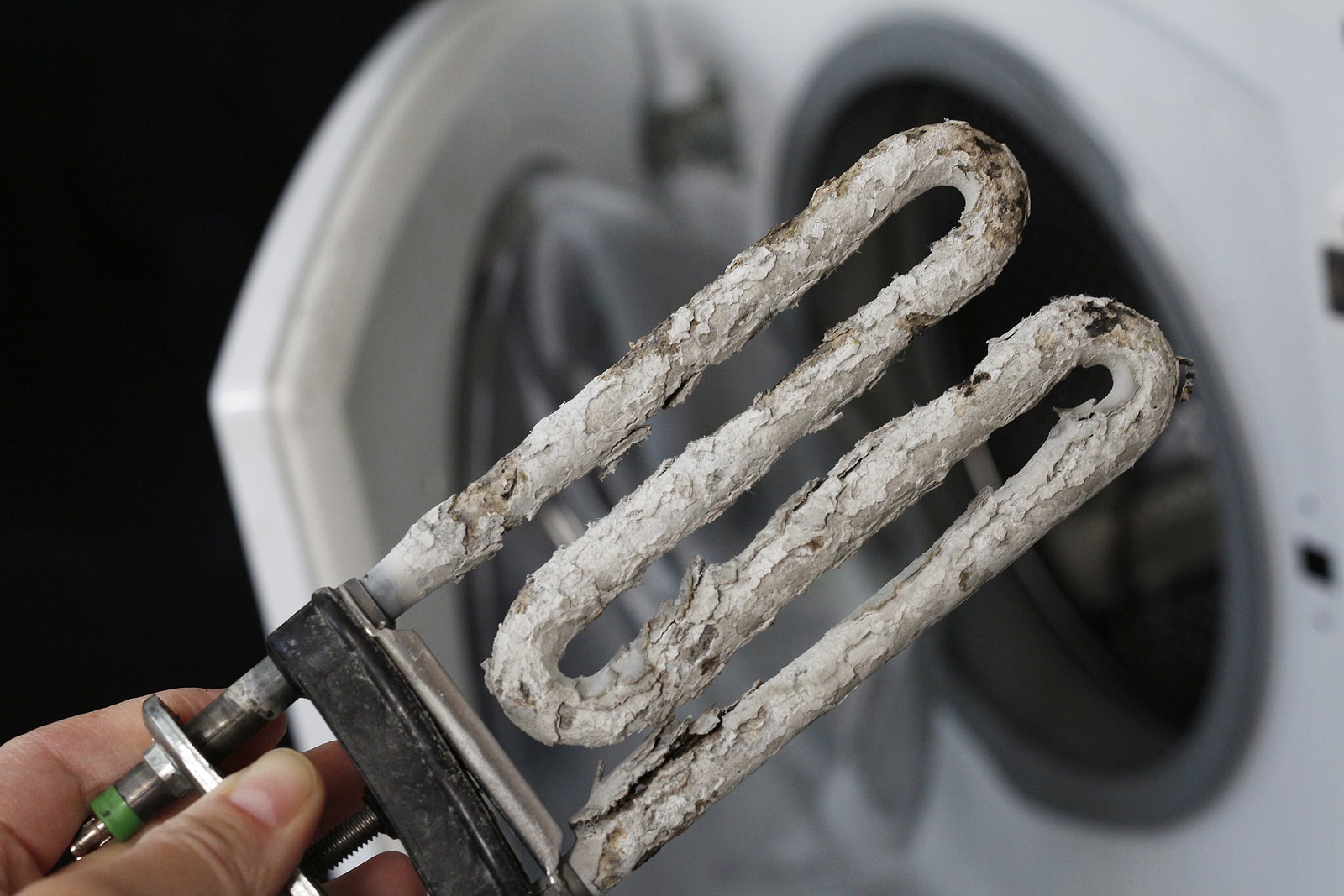
[ad_1]
In the event you’ve ever needed to take a chilly bathe in the course of the chilly winter months, you understand it’s essential to have a water heater put in in your house. However like almost each different equipment in your family, a number of issues can harm your water heater – like sediment in your water.
It’s simple to dismiss your water provide as the rationale on your water heater issues, however generally it’s the sneaky offender – and one you can not ignore. For instance, your water heater tank can accumulate sediment over time from the minerals and particulate matter probably in your water provide. If these supplies aren’t eliminated, they’ll result in a sequence of undesirable outcomes, corresponding to leaking, odd noises, and elevated vitality consumption, lots of which may lower the lifespan of your water heater in half.
In the event you’re experiencing any of those water heater points, you need to tackle them shortly. In any other case, the heater will value much more to restore or change and should hurt you or your property. Then once more, even with thorough repairs, high quality replacements, and well timed upkeep, sediment will proceed to construct up in your water heater tank so long as it’s current in your house’s water provide. Due to this, you need to first take away sediment out of your water to stop it from coming into your water heater and inflicting costly and doubtlessly irreparable harm.
On this article, we’ll stroll you thru a number of methods sediment can break your water heater or shorten its lifespan and steps you may take to remove dust and particles out of your water as soon as and for all. We hope these measures will assist enhance your water heater’s effectivity, efficiency, and life expectancy, so that you received’t must go with out sizzling water whenever you want it essentially the most. Let’s get began!
What’s Sediment and How Does it Get into Your Water Heater?
Sediment is a group of dissolved or suspended solids, like built-up rust, laborious water minerals, sand, silt, clay, dust, and different fragments. These particles primarily come from soil erosion or when crops and animals decompose. Normally, wind, water, and ice assist carry these deposits to rivers, lakes, streams, and reservoirs that serve public water methods and effectively water methods, making it simpler for them to wind up in your water provide and accumulate in your water heater.
Whether or not your water comes from a municipality or a non-public effectively, your water heater is prone to sediment buildup. Metropolis water normally undergoes some degree of filtration at a remedy plant, however a high-quality layer of minerals and different deposits can develop within the water mains over time. Past that, water-main breaks and leaks alongside the general public pipe community can introduce sediment into the water being transported to your property and water heater.
Likewise, if your property will get water from a non-public effectively, sediment can shortly enter your water heater after passing by way of your property’s effectively system and water provide. In a newly put in effectively, the drilling course of naturally releases many particles into the water supply. There, these particles decide on the bedrock ground, solely to be stirred up and pumped into your property as soon as the effectively goes into operation. In case your effectively system is broken or not maintained repeatedly, cracks can kind within the effectively casing and permit sediment to flee into the water provide. Additional, a broken effectively display screen may cause dust and different residues to scrub into the effectively system throughout a rainstorm or flood.
Except you’ve got a mechanism in place to dam sediment attempting to enter your water provide from these sources, sediment will doubtless leach into your water provide and wreak havoc in your water heater and different water-using home equipment.
7 Indicators Sediment Could Be Accumulating in Your Water Heater
Listed below are some telltale indicators of doable sediment buildup in your water heater:
1. Rumbling, popping, or hissing sounds
Water heater noises are a typical indicator of sediment buildup in water heater tanks. In case your water heater is making popping, creaking, hissing, or rumbling sounds, it’s doubtless as a result of minerals within the water have shaped a layer on the floor of the water heater component. Because the heating component heats up, uncommon sounds could come from burning sediments settled on the backside of the tank. Additionally, pockets of air within the water trapped beneath the sediment layer could begin to make popping noises when the warmth is on. You might also hear scorching or hissing sounds when the water beneath the heating parts is boiling to steam.
2. The water will get heat however by no means sizzling
Does your bathe water really feel lukewarm even when the bathe knob is on “scolding sizzling” temperature? Does it take a very long time for decent water to start out flowing from the faucet? If you’re experiencing any of those points, sediment will be the malefactor.
A scarcity of ample sizzling water is an indication of sediment buildup in your water heater. Most traditional water heaters’ storage tanks can maintain from 20 to 100+ gallons of water at any given time. Because the water is heated, water minerals separate from the water molecule and settle on the backside of the water heater tank. Over time, the sediment collects within the tank and creates a layer of insulation between the water and the tank’s heating component. Due to this, much less warmth reaches the water, leading to colder showers and your faucet water not being as sizzling appropriately.
The extra the sediment builds up, the tougher it’s for the tank’s heating component to work. Ultimately, the heater will fail – both by leaking or malfunctioning. And the consequence? A better water invoice due to the leaking, or the system stops working altogether.
3. Cloudy or rust-colored sizzling water
In case your water appears to be like cloudy or has a metallic scent or style, you possibly can have a failing water heater as a result of sediment buildup. Whereas the sediment itself can discolor the water with cloudiness or an orange or reddish hue, it might probably additionally corrode parts within the heater.
Corrosion within the water heater can happen due to the layer of sediment on the heating component. Not solely does sediment buildup within the system limit warmth to the water, however it might probably additionally harm the water heater’s inside lining. As the liner wears away, the metal beneath can deteriorate and corrode. The water can then carry the rust particles from the water heater tank to your bathe, faucets, and water-using home equipment.
4. Leaking or defective stress reduction valve
Is your water heater’s temperature and stress (T&P) reduction valve leaking? Maybe water doesn’t stream by way of the pipe whenever you check the valve. Each eventualities could contain extra than simply changing the valve.
A buildup of sediment, salt, and corrosion on the water heater’s component may cause the component to warmth up greater than typical to make up for the sediment blockage. When this occurs, the tank heats up a lot that it expands and places stress on the water inside. An excessive amount of stress within the tank will finally spring a leak and burst. And if the stress will get an excessive amount of, the tank can explode.
Fortunately, your water heater prevents this downside utilizing its T&P reduction valve, which opens up and releases some water to maintain the stress down. However even with the valve, all that further stress may cause the valve to fail and begin leaking. If that occurs, the stress will proceed to construct within the tank and trigger it to burst or explode.
5. Cracks within the tank or connections
As famous earlier, your water heater tank could increase quickly as a result of extreme warmth. An excessive amount of warmth within the tank can result in cracks within the machine over time. Additionally, corrosion throughout the water tank can result in fractures and breaks. Consequently, it’s possible you’ll discover puddles of water beneath or across the tank. Even worse, a leaking water tank can flood your total dwelling if not changed instantly.
6. Decreased sizzling water stream
You wish to do the dishes shortly, nevertheless it takes an excruciatingly very long time to fill the sink or dishwasher. You examine your low sizzling water stress with the stress from the chilly faucets, and the recent water is the one one which trickles.
Modifications within the water stress that comes out of your bathe or sink are doubtless indicators of sediment buildup within the water heater tank. As you’ve discovered thus far on this article, sediment can accumulate in your sizzling water tank over time. Ultimately, this buildup can disrupt the recent water stress in your house. So, in case your sizzling water stress appears abnormally low, sediment will be the problem.
7. Greater gasoline or electrical energy payments
Water heaters with an excessive amount of sediment on the backside of the tank require extra vitality to warmth the water. As such, the water heater can hike up your gasoline or electrical energy invoice significantly.
How do I do know if sediment is in my water?
A water heater doesn’t solely fail due to sediment buildup within the tank. There are quite a few different causes your heater could not operate because it ought to or cease working altogether. For that reason, we suggest testing your water to find out if sediment will be the purpose behind your water heater woes.
The visible look of the water could present a transparent indication of a possible sediment downside. For instance, if the water has a touch of cloudiness or murkiness, incorporates small particles, or has a contact of orange or purple rust-like colour, it might include sediment. The potential for sediment in your water is bigger in case your water comes from a effectively, notably a shallow effectively, a effectively close to floor waters, or if the effectively casing is broken.
Some sediments in water could also be tough to detect with the bare eye. As such, testing your water is the one means to make certain about its contents. We suggest testing your water for iron, pH, hardness, whole dissolved solids (TDS), manganese, silica, and different bodily traits that will point out doable contamination. In the event you suspect sediments as a result of colour or cloudiness, additionally check for tannins and turbidity.
The easiest way to substantiate if sediment is in your water is to order a testing package, just like the Watercheck + Tannins Testing Package. The usual Watercheck check package from the Nationwide Testing Laboratories, Ltd. incorporates every part it’s essential to establish irregularities in your water.
It can check your water for 75 or extra widespread contaminants, together with:
- Tannins
- Bodily traits (together with Complete Dissolved Solids (TDS), hardness, turbidity, and pH)
- VOCs (together with TCE, MTBE, and PCE) Inorganic chemical compounds (together with nitrates and fluoride)
- Heavy metals (together with iron, arsenic, uranium, and mercury)
- Micro organism (the presence or absence of Complete Coliform and E. Coli)
- Trihalomethanes (THMs)
In the event you’re able to take the guesswork out of your water high quality, you may order the testing package, mail them the pattern, and obtain your in-depth report inside days. Testing your water for sediments has by no means been simpler!
So, I’ve a sediment buildup in my water heater. Now what?
In the event you’ve decided that sediment has amassed in your water heater, you’ll have to flush the system to take away them. Flushing the tank at the very least yearly helps filter out any sediment constructed up within the tank to revive your water heater to its regular working state. This method flush can even assist lengthen the heater’s lifespan.
However what if sediment remains to be in your water provide? Gained’t it nonetheless be an issue? Nice query! That’s why we suggest putting in a whole-house water system and add a sediment pre-filter to stop dangerous particles from coming into and build up within the heater within the first place. Because the saying goes: “Prevention is best than remedy.”
A whole-house water filter acts as a strong line of protection towards all kinds of poisonous water contaminants attempting to enter your family by way of your water provide. It targets and removes impurities like chlorine and chloramines, heavy metals like lead and copper, and extra.
Complete home methods additionally present the additional advantage of not having to arrange a water filter at each faucet in your house as a result of it filters water from the outset. Which means contemporary, clear water flowing to each faucet and water-using equipment, together with your water heater.
It will get higher: When you have sediment in your water, you may customise your entire home system with a sediment pre-filter to dam these troublesome supplies and stop them from wreaking havoc in your water heater, pipes, plumbing, well being, and total family.
Try the Springwell CF1 Complete Home Water Filtration System.
Customise Your Complete Home System with a Sediment Pre-Filter
A sediment filter makes use of mechanical filtration to entice and remove suspended solids coming into your water provide and water filtration system. It removes something from dust and rust to silt and sand – or absolutely anything the filter’s micron-rated capability can seize.
Eradicating sediment not solely protects the entire home filter from harm however permits your water heater to operate extra effectively and last more. Sediment filters additionally scale back cloudiness in water attributable to suspended solids. Excessive concentrations of those solids may cause the water to look brown, orange, or yellow.
However please notice that sediment filters don’t remove chemical compounds, heavy metals, micro organism, or dissolved particulate matter in water. Additionally they don’t enhance the water’s style or odor.
Try the Springwell Spin-Down Sediment Filter or the Springwell Sediment Filter Canister + 5 Micron Filter.
Last Ideas
Going with out sizzling water isn’t any enjoyable, particularly in the course of the winter when temperatures fall. However because of water heaters, we are able to escape the icy-cold showers – so long as our water heater tanks are free from sediment buildup. Sediment in water poses a grave menace to a water heater’s efficiency, effectivity, and lifespan, inflicting points from bizarre sounds and colder water to elevated vitality utilization and diminished water stream. Fortunately, you may add a sediment filter to your entire home system to take away undesirable matter out of your water provide earlier than it reaches your water heater. That means, your water heater can proceed offering sufficient sizzling water on your lengthy, enjoyable showers or whenever you want it on the faucet.
When you have any questions or inquiries about our entire home filters or sediment filters, don’t hesitate to contact us at 800-589-5592 or message us from our contact web page.
[ad_2]
Supply hyperlink








